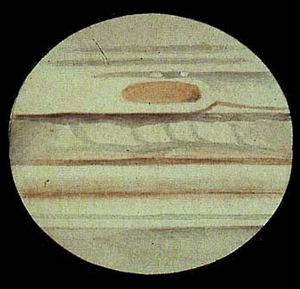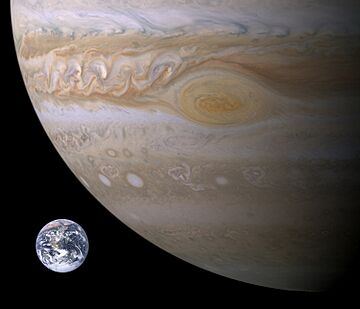Great Red Spot facts for kids
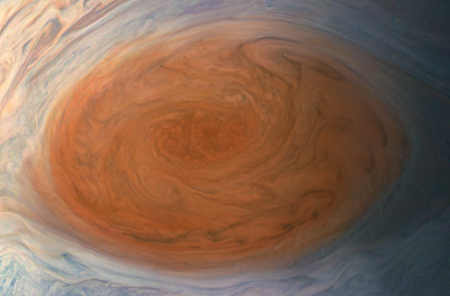
The Great Red Spot is a giant, long-lasting storm on the planet Jupiter. It is the largest storm in our entire Solar System. This huge storm is easy to spot because of its reddish-orange color. Scientists are still figuring out why it's red. It's located 22 degrees south of Jupiter's equator. The Great Red Spot has winds that can reach speeds of up to 432 km/h (268 mph).
People first saw a spot like this in 1831. If it's the same storm, it has been active for at least 361 years! However, a study from 2024 suggests it might be a newer storm.
Contents
Exploring Jupiter's Great Red Spot
Early Sightings of the Giant Storm
Scientists believe a large spot might have existed on Jupiter even before 1664. However, the Great Red Spot we see today was likely first clearly observed in 1830. It became very famous after 1879. There's a big question about whether the storm seen in the 17th century is the same one we observe now. A long time passed between the early sightings and when people started studying it continuously.
Some people credit Robert Hooke with the first sighting in May 1664. But his spot might have been in a different part of Jupiter. Also, it could have been the shadow of one of Jupiter's moons. The next year, Giovanni Cassini described a "permanent spot" that he saw often. He even calculated how fast Jupiter spun. Cassini's spot was watched from 1665 to 1713. But because it was seen for a shorter time and moved differently, we can't be sure it's the same storm.
A painting from 1711 by Donato Creti shows a large red spot on Jupiter. This is the first known picture of such a spot being red. Before the late 1800s, no one had written down that Jupiter had a red feature. The Great Red Spot has been watched regularly since September 5, 1831. Since 1879, scientists have been observing it all the time. A 2024 study suggests that the "permanent spot" from 1665 to 1713 was probably not the same as the Great Red Spot we see today. It seems the older spot disappeared, and a new one formed later.
Modern Views and Changes Over Time
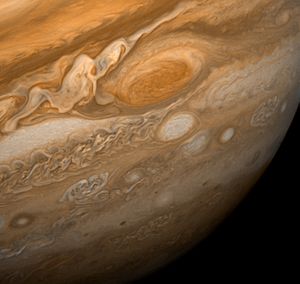
On February 25, 1979, the Voyager 1 spacecraft flew past Jupiter. It sent back the first detailed pictures of the Great Red Spot. These images showed cloud details as small as 160 km (100 mi). The pictures revealed colorful, wavy cloud patterns around the storm.
In recent years, the Great Red Spot has been getting smaller. In 2004, its length was about half of what it was a century earlier. Back then, it was about 40,000 km (25,000 mi) long, which is about three times the diameter of Earth. If it keeps shrinking at this speed, it might become round by 2040.
Scientists are not sure how long the storm will last. They also don't know if its shrinking is a normal change or if it means the storm is fading. In 2019, parts of the storm started "flaking" off its edges. These fragments spun away and disappeared. This made some astronomers wonder if the spot could vanish in a few decades. However, other scientists think the visible size only shows the cloud cover. They believe the actual storm underneath might still be large. They also think the "flaking" is caused by smaller storms interacting with the Great Red Spot. This might mean the Great Red Spot is not in danger of disappearing.
A smaller spot, called Oval BA, formed in March 2000. It was created when three white spots merged. This smaller spot has also turned reddish. Astronomers call it the Little Red Spot or Red Jr. On June 5, 2006, the Great Red Spot and Oval BA seemed to be getting closer. These two storms pass each other about every two years. The Juno spacecraft entered orbit around Jupiter in 2016. It flew directly over the Great Red Spot on July 11, 2017. Juno took many images of the storm from about 8,000 km (5,000 mi) above Jupiter's surface. The Juno mission continues to study Jupiter's atmosphere and the Great Red Spot.
It's important not to confuse the Great Red Spot with the Great Dark Spot. The Great Dark Spot was seen near Jupiter's northern pole in 2000 by the Cassini–Huygens spacecraft. There is also a feature on Neptune called the Great Dark Spot. Voyager 2 photographed Neptune's spot in 1989. It might have been a hole in the atmosphere, not a storm. That spot disappeared by 1994.
How Jupiter's Great Red Spot Works
A Spinning Giant Storm
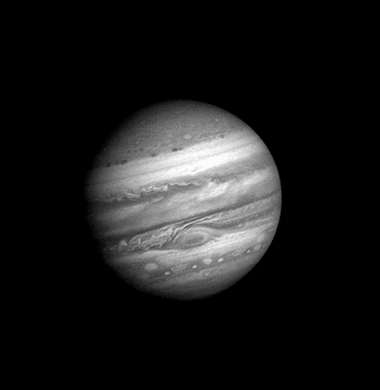
Jupiter's Great Red Spot spins counterclockwise. It completes one rotation in about 4.5 Earth days, or 11 Jovian days. As of April 3, 2017, the storm was 16,350 km (10,160 mi) wide. This makes it about 1.3 times the diameter of Earth. It has been shrinking for about a century, so it is now slightly smaller than Earth. The very top clouds of this storm are about 8 km (5 mi) higher than the clouds around it.
This storm has lasted for centuries because Jupiter has no solid surface. Instead, it has a deep layer of hydrogen. Without a surface to create friction, the swirling winds can keep going. This is why the storm doesn't slow down and disappear.
Special cameras that see infrared light show that the Great Red Spot is colder than most other clouds on Jupiter. This means it is higher up in the atmosphere. However, the air far above the storm is much hotter than other parts of the planet. Scientists think sound waves from the storm's turbulence travel upwards. These waves then break in the upper atmosphere, turning their energy into heat. This makes the upper atmosphere above the storm very hot, like ocean waves crashing on a beach.
Scientists have tracked the storm's counterclockwise spin since 1966. Voyager spacecraft videos confirmed this movement. The spot is kept in place by strong wind currents, called jet streams. There's a gentle eastward jet stream to its south and a very powerful westward one to its north. Even though winds around the edge of the spot are fast, the air inside seems to move very little. The storm's rotation has slowed down over time, possibly because it has been shrinking.
The Great Red Spot stays at roughly the same latitude. But its longitude (its position around Jupiter) changes all the time. It can drift back and forth by about one degree over 90 days. Because Jupiter's gas body doesn't spin at the same speed everywhere, astronomers use different systems to measure longitude. The Great Red Spot has circled the planet at least 10 times since the early 1800s. Its speed of drift has changed a lot over the years.
Peeking Inside the Storm
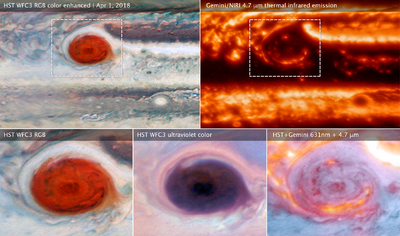
The Great Red Spot is a huge, oval-shaped storm. It is the largest anticyclonic storm in the Solar System. Scientists want to know how deep it goes and what its inside looks like. Pictures and cloud tracking from spacecraft helped measure its speed and how it spins. The storm is located in a thin, spinning ring along Jupiter's fastest westward jet stream.
During NASA's 2016 Juno mission, scientists gathered information about the storm's gravity and heat. This helped them understand its structure and depth. In July 2017, Juno flew over the Great Red Spot again. It used special tools called Microwave Radiometers (MWR) to see how far the storm reached below the clouds. These scans suggested the storm goes down about 240 km (150 miles) below the cloud tops. The pressure there is much higher.
Different ways of analyzing the data suggest the storm's depth is between 200 and 500 km (124 to 310 miles). This means the winds of the Great Red Spot continue to get stronger far below what we can see. They only start to slow down at even deeper levels.
Earlier missions like Galileo and Cassini also used heat-sensing cameras. They found that the Great Red Spot has a cold center with warmer air rising around it. This shows that the storm has different temperatures inside. By studying Jupiter's temperature, cloud particles, and gases like ammonia, scientists have learned a lot. They can connect what they see in the clouds to the temperatures and gases deep inside the storm.
Scientists have found that the storm's core is about 1.0–1.5 K warmer than areas to its east and west. It's also 3.0–3.5 K warmer than areas to its north and south. This means the storm is present at many different heights in Jupiter's atmosphere. Spacecraft like Cassini also mapped the gases inside the storm, such as phosphine and ammonia. This helps track how air moves up and down in Jupiter's atmosphere.
The highest amounts of phosphine and ammonia were found north of the storm's edge. This helped show how air moves south and that the cloud column gets higher in some places. However, there's less ammonia below the visible clouds on the southern edge of the storm. This suggests that air is sinking in that area. These differences in temperature, height, and air movement help the Great Red Spot keep spinning. The way the air sinks and the different amounts of gases suggest the storm might be tilted from its northern to its southern edge. The depth and structure of the Great Red Spot have changed over many years. Scientists are still trying to understand why it is so deep and how the jet streams below it power the storm.
The Mystery of Its Red Color
It is not known for sure what makes the Great Red Spot its reddish color. Scientists have some ideas, based on experiments in labs. They think the color might come from chemicals created when sunlight hits certain compounds. These compounds include ammonium hydrosulfide and a gas called acetylene. When sunlight reacts with them, they might produce reddish materials. These materials are likely complex organic compounds. The fact that these compounds are high up in the atmosphere might also help create the color.
The Great Red Spot's color changes a lot. It can be a deep brick-red, a pale salmon color, or even almost white. Sometimes, the spot seems to disappear. When this happens, we can only see its location as a "Red Spot Hollow" in the South Equatorial Belt (SEB). Its visibility seems connected to the SEB. When the belt is bright white, the spot tends to be dark. When the belt is dark, the spot is usually light. These changes in color happen at different times. For example, between 1947 and 1997, the spot was darkest during certain periods like 1961–1966 and 1968–1975.
See also
 In Spanish: Gran Mancha Roja para niños
In Spanish: Gran Mancha Roja para niños
- Extraterrestrial vortex
- Great Dark Spot, a similar storm on Neptune
- Great White Spot, a similar storm on Saturn
- Hypercane, a hypothetical type of very large storm on Earth
- WISEP J190648.47+401106.8, a brown dwarf observed to have a similar large storm
 | Charles R. Drew |
 | Benjamin Banneker |
 | Jane C. Wright |
 | Roger Arliner Young |



